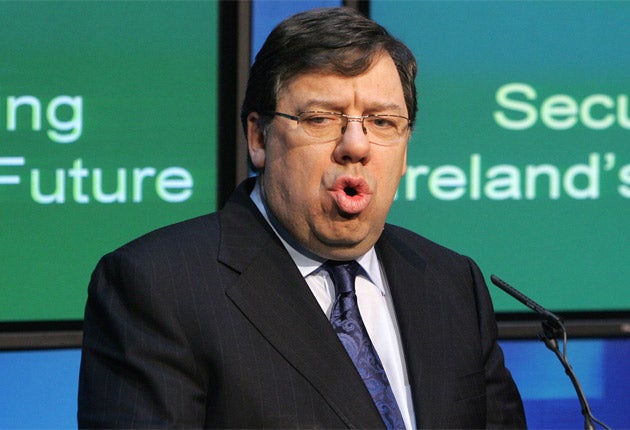Ireland invests hopes in brutal austerity plan
Four-year programme could save £13bn

The beleaguered Irish government experienced another day of political and financial fire-fighting as it unveiled a four-year austerity plan designed to affect €15bn (£13bn) worth of spending cuts and higher taxes yesterday.
The aim of the document will amount to a return to the higher tax levels of 2006 within four years. At the same time, the administration hopes the measures will help increase international confidence in the Irish economy and its shattered banking system.
The plan is only one element in this effort. A budget is due on 7 December, while talks are still underway with the International Monetary Fund and European Union. A general election is due in the new year. Launching the document, the outgoing Prime Minister Brian Cowen declared: "We can and will pull through as we have in the past. We love our country and we want to make sure our children have a future here too."
Income tax and other taxes are to rise, with many of the lower-paid being drawn into the tax net. There will be cuts to social welfare and to public-sector salaries and pensions, while a new domestic water charge is to be introduced. Mr Cowen said no one could be sheltered from the pain, but pensioners – who comprise a formidable lobby – appeared to have escaped cuts.
Although the document is more than 100 pages, there were criticisms that it was short on detail in key areas. The principal opposition party, Fine Gael, said it was extraordinary that the document had not addressed the banking crisis, arguing that some of its important calculations could change once the country reached an agreement with the IMF and EU.
Party leader Enda Kenny, who is a favourite to lead the next administration, said he had received confirmation from the EU that an incoming government would not be bound by individual proposals within the plan. When Mr Cowen confirmed that a bailout figure of about €85bn was under discussion and described it as an overdraft, Labour leader Eamon Gilmore told him this was "one hell of an overdraft".
There was little or no shock evident yesterday among the Irish public, most of whom stoically regard painful cutbacks and new taxes as a regrettable necessity. Hardly anyone in the country will be unaffected by the plan, which includes a proposed 14 per cent cut in social welfare over four years. The minimum wage will be lowered by €1 to €7.65 per hour.
As many as 13,000 public-sector jobs are to be lost in addition to 12,000 which have already gone, while those hired from now on will be paid 10 per cent less. VAT will increase from 21 per cent to 23 per cent by 2014.
But Ireland's low rate of corporation tax, much resented in some European capitals, is to remain unchanged at 12.5 per cent, Dublin having argued that it was one of the engines of its one-time prosperity and could be so again. The tax rate has attracted a number of international companies, which have established their European headquarters in Dublin. A change to the tax rate could prompt an exodus that would have damaging implications for Ireland's job levels.
Mr Cowen has said he will call an election once the budgetary process is completed, a stance which is being accepted by his Fianna Fail party. But this is regarded by opposition parties and within Fianna Fail, as a temporary reprieve which will run out in the new year, and possibly before then if he cannot pass a budget.
One of his ministers, Mary Hanafin, has already declared her interest in succeeding him while a second, Foreign Affairs minister Micheal Martin, did not rule himself out of contention.
The moves on the minimum wage, the tax net and other measures were criticised by trade unions. Jack O'Connor, president of Ireland's largest union, the Services, Industrial, Professional and Technical Union, said: "This is a road map back to the Stone Age. Ireland needs a strategy for growth, but this plan will achieve the opposite."
Irish fiscal crisis fact file
15 billion euros (£12.7bn) to be saved by 2014.
10 billion euros (£8.4bn) to be cut from public spending.
5 billion euros to be raised from tax rises.
6 billion euros (£5.1bn) to be saved in the first year.
1.9 billion euros (£1.6bn) to be raised by changing tax banding.
3 billion euros (£2.5bn) to be cut from the welfare budget.
24,750 public sector jobs to be axed.
23 per cent rate of VAT by 2014, after a staggered two-point rise.
Join our commenting forum
Join thought-provoking conversations, follow other Independent readers and see their replies
Comments
Bookmark popover
Removed from bookmarks